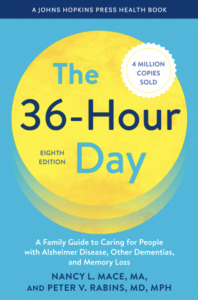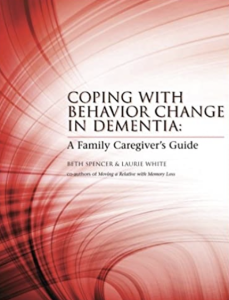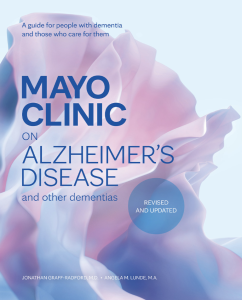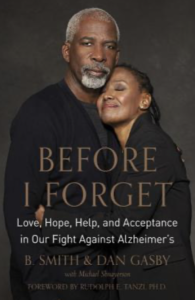Suggested Reading
Updated March 2025
Publications
- Triangle Area E-News (sign up for delivery via email)
- 10 Absolutes of Memory Loss
- Follow us on Facebook for updates, tips, and additional links.
Companion Cards
Companion cards are a simple and effective way for care partners to let people know their loved one has dementia and may have language difficulties or exhibit unexpected behaviors. Use these cards in public – hand to waitstaff, store employees, law enforcement officers, etc. – to avoid frustration and preserve your family member’s dignity.
Suggested Websites and Resources
- Aging
- Alzheimer’s Disease & Dementia
- Non-Alzheimer’s Dementias & Mild Cognitive Impairment
- Caregiving
- Planning, Insurance, Hospice & Long Term Care
- Research Participation Options
- Our Staff’s Favorite Books
Aging
- Choosing Wisely “Ten Things Physicians and Patients Should Question,” are recommendations from the American Geriatrics Society intended to raise professional and public awareness about treatments and tests impacting older adults.
- VA Caregiver Support A new VA website designed specifically to support care partners of veterans that offers programs both in and out of the home.
- NC Division of Aging and Adult Services From the NC Division of Aging and Adult Services, an overview of and links to state-run services and programs that serve older adults (click on the links to “Alzheimer’s” and “Family Caregiver Support”).
- HealthinAging.org “Living with Multiple Health Problems: What Older Adults Should Know,” is an important two-page tip sheet. See also new Beers List of Medications to avoid in older persons and practical instructions for caregiving problems.
- Legal Aid of NC Legal Aid of NC Senior Law Project (SLP) serves clients 60 years of age or older. Special priority is given to those seniors with the greatest economic or social need. The SLP team members are located in various Legal Aid NC offices.
- National Resource Center on LGBT Aging The National Resource Center on LGBT Aging provides training, technical assistance and educational resources to aging providers, LGBT organizations and LGBT older adults.
- The New Old Age A regular feature of the New York Times, this is an outstanding blog and news-source on elder care.
- NIH Senior Health Health and wellness information for older adults from the National Institutes of Health that is easy to access and easy to understand, with short videos.
- MedlinePlus MedlinePlus is an NIH health website for patients and their families and friends. Look up info on a drug or supplement, view medical videos, get links to medical topics, or find out about clinical trials on a disease or condition. For AD caregiving resources, go to MedlinePlus Alzheimer’s Caregivers.
- Family Conversations with Older Drivers Addresses driving issues for older adults such as warning signs of poor driving, dementia and driving, and coping with driving cessation.
- NIA Videos The National Institute on Aging’s YouTube channel offers free videos about AD research, healthy aging, exercise and other aging-related topics.
- Elder Justice The new website offers resources for family members, victims of elder abuse, and anyone who works with older adults. Information includes how to report elder abuse and financial exploitation in all 50 states.
- Facts About Cognitive Aging The Institute of Medicine (IOM): Cognitive Aging: Progress in Understanding and Opportunities for Action. Visit The IOM website and see seven tips in Cognitive Aging, An Action Guide for Individuals and Families.
- How to Prevent Falls The U.S. Department on Human and Health Services offers a fact sheet on “What You Can Do” to prevent falls. By making some changes, you can lower your chances of falling.
Alzheimer’s Disease & Dementia
- 800-272-3900 The Alzheimer’s Association 24/7 Helpline provides reliable information and support to people with memory loss, caregivers, health care professionals and the public. Consultations are provided by master’s level clinicians; and translation services featuring over 140 languages and dialects are available.
-
Now What? Next Steps After an Alzheimer’s Diagnosis A diagnosis of Alzheimer’s disease can be difficult. Use this checklist to get accurate information and support to help you know what to expect and what to do next.
- Project CARE Project C.A.R.E. (Caregiver Alternatives to Running on Empty) is a state funded program that helps North Carolina caregivers who are caring for someone with dementia in their homes by providing services, resources and information through an expert family consultant.
- Alzheimer’s Association The Alzheimer’s Association provides education and support for all those affected by AD and related dementias. Go to the website to find resources and your local chapter.
- MedicAlert + Safe Return MedicAlert® + Alzheimer’s Association Safe Return® is a 24-hour nationwide emergency response service for individuals with AD or a related dementia who wander or have a medical emergency.
- ALZConnected ALZConnected is an online community for AD support. Post questions, share opinions and join discussion groups.
- Community Resource Finder The Alzheimer’s Association Community Resource Finder is an online guide for people living with AD and their care partners to help with selecting dementia providers, programs and services.
- Just diagnosed A diagnosis of Alzheimer’s disease is life-changing. You can take an empowering first step by learning more about the changes you may experience, and what to do next to move forward with your life.
- Bob DeMarco has one of the best sources of shared experiential wisdom from families who care for and about persons with AD. “The Alzheimer’s Reading Room” blog is no longer live, but DeMarco’s YouTube videos remain popular and helpful.
- Caring.com The “Alzheimer’s Solution Center” (under “Health A-Z” > “Alzheimer’s disease”), provides links to learning more about different aspects of AD, including guides to care separated out by disease stage.
- By Us For Us “By Us For Us” guides are created By persons with dementia and/or care partners, For persons with dementia and/or care partners.
- Alzheimer’s Disease Education and Referral Center or 800-438-4380 The ADEAR Center is a resource for information on AD, on locating AD research centers and clinical trials, and for credible, free and current National Institute on Aging publications on AD, caregiving, and other aging-related challenges.
- TimeSlips TimeSlips is an improvisational storytelling method for people with dementia and their caregivers to read, write and share stories with family and friends.
- Young Dementia UK this resource focuses on younger-onset dementia, families, friends and supporters in the U.K., but is applicable to those in the U.S.
- Early-Onset Alzheimer’s Resources The National Institute on Aging provides an expanded online resource list for individuals and families with questions about younger- or early-onset dementias.
- National Center for Complementary and Integrative Health Here are five things to know about current research on complementary health approaches for cognitive function, dementia, and Alzheimer’s disease.
- Making Sense of Alzheimer’s The Penn Memory Center’s Ethics and Policy Program in Philadelphia offers windows into how people think about and live with AD. There are written, audio, and video clips from people living with the disease.
Non-Alzheimer’s Dementias & Mild Cognitive Impairment
- National Stroke Association- Vascular Dementia Vascular dementia is common after a stroke, The National Stroke Association gives readers a concrete definition of vascular dementia, tips on managing the diagnosis, what can be done for treatment and tips on how to care for someone living with the diagnosis.
- Association for Frontotemporal Degeneration The Association for Frontotemporal Degeneration explains FTD diagnoses, navigating health care, caregiving challenges, planning for the future, and finding support. See Partners in FTD Care “What To Do About” Symptom Tip Sheets.
- Mild Cognitive Impairment Mild Cognitive Impairment (MCI) is neurocognitive disorder that impacts the memory but that does not impact one’s ability to complete activities of daily living. Memory problems may be minimal to mild and hardly noticeable to the individual.
- Lewy Body Dementia Association This Lewy Body Dementia Association website provides info, support and connection to an online community for LBD families and professionals.
- Fact Sheets on Types of Dementia Comprehensive, detailed, understandable fact sheets on disorders that cause dementia such as AD, Frontotemporal dementia, Lewy body and vascular dementia.
- Dementia Alliance International A new organization for people with dementia in the US, Canada, Australia and other countries with a vision of, “a world where a person with dementia continues to be fully valued.”
Caregiving
- Caregiver Network News is MemoryCare of Asheville’s eNewsletter. Their newsletter includes answers to caregivers’ frequently asked questions and information addressing caregivers’ common concerns.
- Interactions Between Supplements and Prescription Medication Many individuals may be at risk from simultaneously taking dietary supplements and medications. This NIH online tool provides information about interactions between supplements and prescription or over-the-counter drugs.
- Things to Know About Your Medications A website that provides information and warnings about using, storing, and disposing of over-the-counter medicines for a variety of symptoms.
- Alzheimer’s Disease Facts and Figures The 2015 Alzheimer’s Disease Facts and Figures includes a Special Report on disclosing a diagnosis of AD.
- National Council for Aging Care Access information and professional support to guide your physical, emotional, and financial well-being. The Council’s resources and network of experts can help ensure your home evolves to best accommodate your changing budget, mobility, and health.
- Family Caregiver Alliance Family Caregiver Alliance, a pioneer caregiver organization, offers information and advice for caregivers, including fact sheets (e.g., “Caregiver’s Guide to Understanding Dementia Behaviors”).
- Eldercare Locator Eldercare Locator, a service of the U.S. Administration on Aging, is a nationwide service that connects older Americans and their caregivers with information on senior services.
- Lotsa Helping Hands A free service to assist in coordinating care among family and friends through online communities that organize daily life during times of medical crisis or caregiver exhaustion in neighborhoods and communities worldwide.
- Tips and Resources for Alzheimer’s Caregiving Easy-to-read tip sheets and resources for AD caregivers covering topics such as behaviors, communication, caregiver health, safety, and legal and financial issues.
- Preserving Identity How to Keep A Loved One with Dementia Safe: Ways to protect your parents while preserving their identity. Follow the link for ideas about providing a safe and stimulating environment.
- Tips on Being a Long Distance Caregiver Long-Distance Caregiving—Getting started, a National Institute on Aging (NIA) online resource, provides tips on being a helpful long-distance caregiver of an aging relative.
- How to Support Primary Caregivers Long-Distance Caregiving—A family Affair, another NIA resource, offers strategies for how to support the spouse or the sibling who lives closest to an aging parent and is the primary caregiver.
- AARP Resources on Long Distance Caregiving The AARP caregiving website includes articles, tools, work sheets and tips on how to plan, prepare and succeed as a long distance caregiver.
- Long Distance Caregiving – So Far Away This is an easy to read booklet that is organized in an answer-and-question format with the most common long distance caregiving questions.
Planning, Insurance, Hospice & Long Term Care
- IRS Publication 926 The Household Employer’s Tax Guide
- BenefitsCheckUp BenefitsCheckUp is free service of the National Council on Aging. BenefitsCheckUp asks a series of questions to help identify eligibility for programs that help with everyday expenses including medications, health care, food, utilities, and legal expenses.
- National Hospice and Palliative Care This National Hospice and Palliative Care site offers info on living with an illness, caregiving, grieving, finding a hospice, and free advance directives.
- Understanding Palliative vs. Hospice Site explains palliative care (vs. hospice) and offers an interactive questionnaire to assist people in determining whether palliative care is appropriate.
- Quality Care Finder Designed by the Centers for Medicare & Medicaid Services, the site offers a broad range of health, Medicare and resource information as well as a tool to make “apples-to-apples” comparisons of long-term-care facilities, physicians and services.
- Medicare Rights Center The Medicare Rights Center works to ensure access to affordable health care for older adults and people with disabilities and provides consumers with information on navigating Medicare benefits and Medicare appeals.
- NC SHIIP The NC website for the Senior Health Insurance Information Program. SHIIP provides free counseling to Medicare beneficiaries and caregivers about Medicare, Medicare supplements, Medicare Advantage, Medicare Part D, and long-term care insurance. SHIIP is available in every state.
- Prepare for Your Care The PREPARE website is a uniquely easy-to-follow program to help families prepare for medical decision-making.
- Advocating for Quality Long-Term Care The National Consumer Voice for Quality Long-Term Care website with resources to help family members advocate for quality care in long-term care facilities.
- Long-Term Care for LGBT Community A life and financial toolkit for long-term care planning for the LGBT community. Lambda Legal’s “Take the Power” includes tools for protecting individuals, their families, wishes and assets. Hard copies or electronic versions available free.
- Advanced Dementia Neighborhoods Rebecca Mead’s 2014 “A Sense of an Ending” describes the advanced dementia palliative care model used at Beatitudes Campus, a retirement community in Arizona. Beatitudes Campus has become “an incubator for a holistic model of care” with its person-centered approach.
- Managing Someone Else’s Money Four easy-to-understand booklets to help financial caregivers. The guides are for agents under powers of attorney, court-appointed guardians, trustees, and government fiduciaries (Social Security representatives’ payees and VA fiduciaries). Booklets explain financial duties, how to handle scams and exploitation, and where to go for help.
- Continuing Care Retirement Community Make sure you have thought of everything before moving into a continuing care retirement community! Follow the link to read the article for suggestions and ideas on things that you may have overlooked.
- Hospital Discharge Planning Checklist A checklist for individuals living with AD and their caregivers provides a guiding list of information to remember as they prepare to leave a care setting such as a hospital or nursing home. A list of resources and related agencies is included.
- Caregivers Guide to Emergency Room Visits Next Step in Care’s guide to ER visits for family caregivers. Suggestions about when to go to the ER, what to take, and what happens there.
- Friends of Residents in Long-Term Care Friends of Residents in Long-Term Care is a resource for NC families looking for long-term care or seeking help with an unresolved issue. Friends of Residents also works to influence public policy on behalf of residents and personal care aides.
Research Participation Options
- The NC Registry for Brain Health is designed to increase awareness of Alzheimer’s disease and related disorders and to connect North Carolinians of all ages to research opportunities designed to improve brain health. When you join the NC Registry for Brain Health, you will learn about research taking place at Duke University, East Carolina University, North Carolina A&T State University, The University of North Carolina at Chapel Hill, and Wake Forest School of Medicine.
- TrialMatch – Clinical Studies Matching Service Online or phone registration for people with AD or healthy research volunteers. TrialMatch refers for drug and non-drug trials for persons with AD, MCI or healthy controls based on the person’s profile and interests. 1-800-272-3900.
- ClinicalTrials.gov A registry and results database that includes all US and international drug trials ongoing and completed on all diseases or conditions. User-friendly descriptions of AD-specific trials.
- NIA Clinical Trials National Institute on Aging updated database. Search 50 active trials. NIA does not collect personal information or offer a matching service.
- Participating in Alzheimer’s Research The long-awaited pamphlet from the National Institute on Aging and the National Institute of Health with everything you wanted to know about participating in AD research.
Our Staff’s Favorite Books
Educational Reading
by Nancy L. Mace and Peter Rabbins, 2025.
 “Whether a person has Alzheimer disease or another dementia, he or she will face a host of problems. The 36-Hour Day will help family members and caregivers address these challenges and simultaneously cope with their own emotions and needs.”
“Whether a person has Alzheimer disease or another dementia, he or she will face a host of problems. The 36-Hour Day will help family members and caregivers address these challenges and simultaneously cope with their own emotions and needs.”
Coping with Behavior Change in Dementia: A Family Caregiver’s Guide
by Laurie White, Beth Spencer, 2015. “This handbook is intended to help families understand possible causes of common behavior changes and learn to respond more effectively to behaviors.”
“This handbook is intended to help families understand possible causes of common behavior changes and learn to respond more effectively to behaviors.”
Mayo Clinic on Alzheimer’s disease and Other Dementias
by Jonathan Graff-Radford, M.D., Angela M. Lunde, M.A., 2025
 “In this seventh edition, expert neurologists from the Mayo Clinic organize this new research into a thorough and digestible guidebook that provides caregivers with the most up-to-date information regarding the disease.”
“In this seventh edition, expert neurologists from the Mayo Clinic organize this new research into a thorough and digestible guidebook that provides caregivers with the most up-to-date information regarding the disease.”
 “This comprehensive guide is intended to support families from the beginning to the end of the caregiving journey. A large section of the book is devoted to moving decisions and logistics, incorporating the content of the original book as well as new information.”
“This comprehensive guide is intended to support families from the beginning to the end of the caregiving journey. A large section of the book is devoted to moving decisions and logistics, incorporating the content of the original book as well as new information.”
Beyond the Basics
B. Smith, 2016.
A Bittersweet Season: Caring for Our Aging Parents-and Ourselves
by Jane Gross, 2012.
 “When Jane Gross found herself thrust into a caretaker role for her mother, she was forced to face challenges that she had never imagined. In “A Bittersweet Season” readers learn about relocating a parent, dealing with Medicaid and Medicare, and providing for your own needs.”
“When Jane Gross found herself thrust into a caretaker role for her mother, she was forced to face challenges that she had never imagined. In “A Bittersweet Season” readers learn about relocating a parent, dealing with Medicaid and Medicare, and providing for your own needs.”
by Pauline Boss, 2011.
 Loving Someone Who Has Dementia is about how to manage on-going stress and grief. Dr. Boss helps caregivers find hope in “ambiguous loss” — having a loved one both here and not here, physically present but psychologically absent.”
Loving Someone Who Has Dementia is about how to manage on-going stress and grief. Dr. Boss helps caregivers find hope in “ambiguous loss” — having a loved one both here and not here, physically present but psychologically absent.”
by Dasha Kiper, 2023.
 “Inspired by Dasha Kiper’s experience as a caregiver and counselor, and informed by research, “Travelers to Unimaginable Lands” describes the pressure dementia exerts on relationships and offers caregivers the perspective they need to be gentler with themselves.
“Inspired by Dasha Kiper’s experience as a caregiver and counselor, and informed by research, “Travelers to Unimaginable Lands” describes the pressure dementia exerts on relationships and offers caregivers the perspective they need to be gentler with themselves.
For more help with your questions about memory problems, contact:
Duke Dementia Family Support Program
919-660-7510

